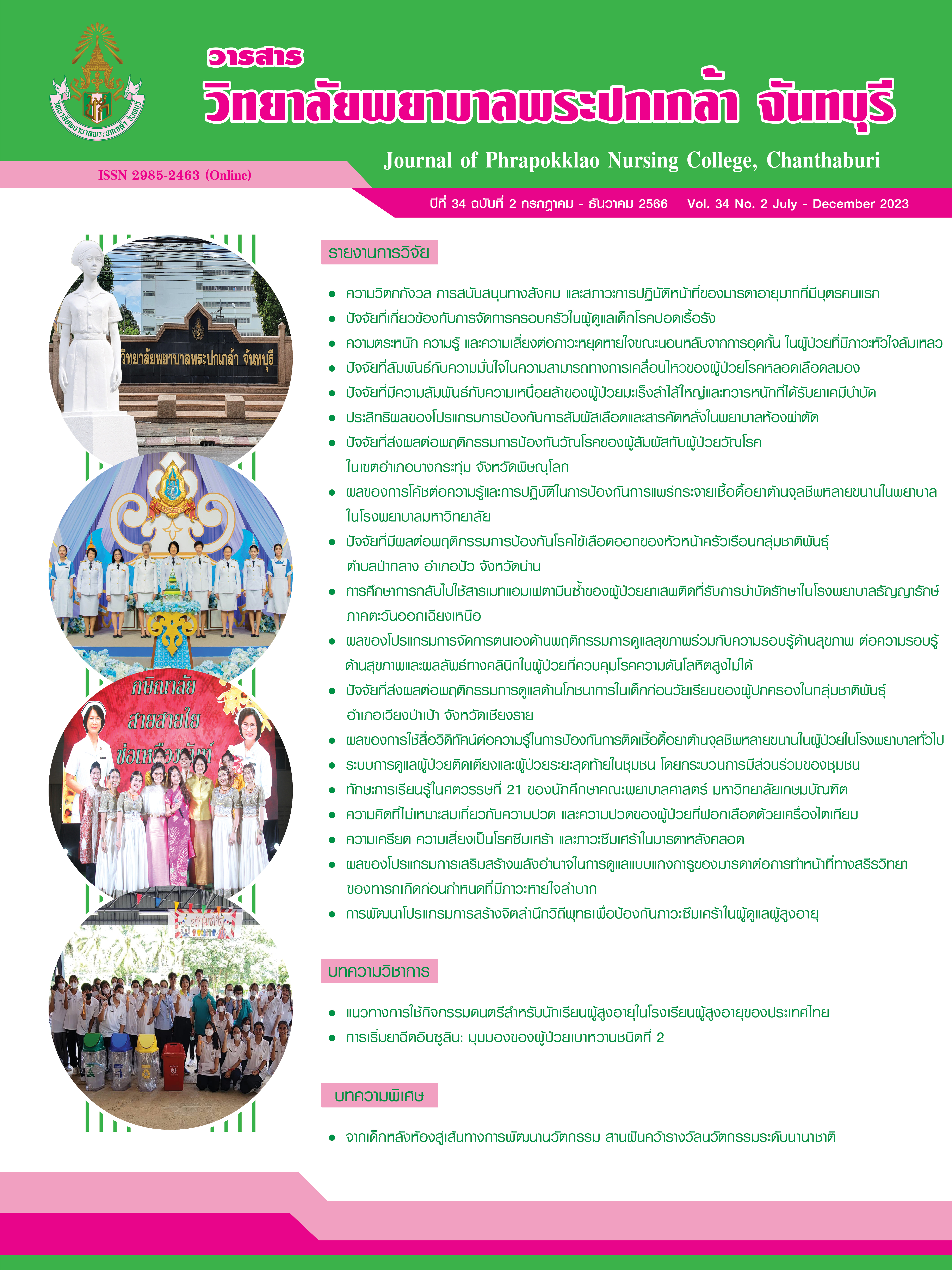Factors Related to Fatigue in Patients with Colorectal Cancer Receiving Chemotherapy
Keywords:
Fatigue, Patients with colorectal cancer, ChemotherapyAbstract
This descriptive correlational research aimed to investigate the relationship among hemoglobin level, physical activity, nutritional status, and fatigue in patients with colorectal cancer receiving chemotherapy. The participants were 136 patients with colorectal cancer who attended the chemotherapy unit of Police General Hospital, King Chulalongkorn Memorial Hospital, and the National Cancer Institute. The research instruments included the demographic data record form, the physical activity questionnaire with a reliability of .72, the Mini Nutrition Assessment (MNA) with a reliability of .70, and the revised Piper Fatigue Scale (PFS) with a reliability of .91. Data were collected from June to December 2020. Statistics used for data analysis included frequency, percentage, mean, standard deviation, and Pearson’s product moment correlation.
The research results revealed that patients with colorectal cancer had the total mean score of fatigue at a moderate level (M = 5.17, SD = .68). Hemoglobin level, physical activity, and nutritional status were negatively statistically significantly related to fatigue in patients with colorectal cancer (r = -.224, p < .01; r = -.306, p < .001; and r = -.299, p < .001, respectively).
This research suggests that nurses should assess fatigue of patients with colorectal cancer every episode of chemotherapy as well as cooperate with patients for fatigue management.
References
กองยุทธศาสตร์และแผนงาน สำนักงานปลัดกระทรวงสาธารณสุข. (2560). สถิติสาธารณสุข พ.ศ. 2559. นนทบุรี: ผู้แต่ง.
กิตติกร นิลมานัต, ขนิษฐา นาคะ, วิภาวี คงอินทร์, เอมอร แซ่จิว, พัชรียา ไชยลังกา, และปิยะภรณ์ บุญพัฒน์. (2556). ภาวะโภชนาการของผู้สูงอายุที่อาศัยอยู่ในพื้นที่สามจังหวัดชายแดนภาคใต้. วารสารสภาการพยาบาล, 28(1), 75–84.
กุลธิดา หุมอาจ. (2561). ปัจจัยทำนายความเหนื่อยล้าของผู้ป่วยหลังการเกิดโรคหลอดเลือดสมองระยะแรก (วิทยานิพนธ์ปริญญามหาบัณฑิต). กรุงเทพฯ: จุฬาลงกรณ์มหาวิทยาลัย.
จุฬาภรณ์ จตุปาริสุทธิ์, และวารุณี รัตโนทัย. (2553). อุบัติการณ์ของภาวะโลหิตจางในผู้ป่วยโรคมะเร็งนอกระบบโลหิตวิทยาที่ได้รับการรักษาด้วยยาเคมีบำบัดในโรงพยาบาลกลาง. วารสารศูนย์การศึกษาแพทยศาสตร์คลินิก โรงพยาบาลพระปกเกล้า, 27(4), 211–221.
ชยุต ใหม่เขียว, และเดชา ทำดี. (2553). ผลของการใช้แนวปฏิบัติการป้องกันภาวะเยื่อบุช่องปากอักเสบในผู้ป่วยมะเร็งที่ได้รับเคมีบำบัด. พยาบาลสาร, 37(1), 86–95.
ประไพ เชิงทวี, และสุวรรณี สิริเลิศตระกูล. (2560). ปัจจัยที่มีความสัมพันธ์ต่อภาวะซึมเศร้าในผู้ป่วยมะเร็งลำไส้ใหญ่และทวารหนักที่ได้รับยาเคมีบำบัด: กรณีศึกษาที่หน่วยมะเร็งวิทยา โรงพยาบาลรามาธิบดี. ศรีนครินทร์เวชสาร, 32(1), 63–70.
ปรารถนา ฉั่วตระกูล, ศิริรัตน์ ปานอุทัย, และทศพร คำผลศิริ. (2556). อาการเหนื่อยล้าในผู้ป่วยสูงอายุโรคมะเร็งลำไส้ใหญ่และทวารหนักที่ได้รับเคมีบำบัดและปัจจัยที่เกี่ยวข้อง. พยาบาลสาร, 40(3), 62–74.
พัชรินทร์ แก้วรัตน์, วรรณา ฉายอรุณ, และวาสินี วิเศษฤทธิ์. (2560). ประสบการณ์ชีวิตของผู้ป่วยมะเร็งลำไส้ใหญ่ขณะรักษาด้วยเคมีบำบัด. วารสารวิชาการมหาวิทยาลัยอีสเทิร์นเอเชีย ฉบับวิทยาศาสตร์และเทคโนโลยี, 11(1), 224–234.
เพียงใจ ดาโลปการ. (2545). ปัจจัยที่สัมพันธ์กับความเหนื่อยล้าของผู้ป่วยมะเร็งเต้านมที่ได้รับเคมีบำบัด (วิทยานิพนธ์ปริญญามหาบัณฑิต). กรุงเทพฯ: จุฬาลงกรณ์มหาวิทยาลัย.
ภัทริกา ปัญญา, จงจิต เสน่หา, วิมลรัตน์ ภู่วราวุฒิพานิช, และนพดล โสภารัตนาไพศาล. (2559). ปัจจัยที่มีอิทธิพลต่อภาวะโภชนาการของผู้ป่วยมะเร็งลำไส้ใหญ่และลำไส้ตรงที่ได้รับยาเคมีบำบัด. วารสารพยาบาลศาสตร์, 34(1), 66–76.
สถาบันมะเร็งแห่งชาติ กรมการแพทย์. (2558). ทะเบียนมะเร็งระดับโรงพยาบาล พ.ศ. 2556. กรุงเทพฯ: บีทีเอส เพรส.
สถาบันมะเร็งแห่งชาติ กรมการแพทย์. (2559). ทะเบียนมะเร็งระดับโรงพยาบาล พ.ศ. 2557. กรุงเทพฯ: พรทรัพย์การพิมพ์.
อวยพร สวัสดี. (2557). ปัจจัยคัดสรรที่สัมพันธ์กับความเหนื่อยล้าในผู้ป่วยโรคหลอดเลือดสมอง (วิทยานิพนธ์ปริญญามหาบัณฑิต). กรุงเทพฯ: จุฬาลงกรณ์มหาวิทยาลัย.
อังศวีร์ ภณทองสมพงษ์, พรรณวดี พุธวัฒนะ, และธิราภรณ์ จันทร์ดา. (2557). ภาวะโภชนาการและการเปลี่ยนแปลงแบบแผนการบริโภคของผู้ป่วยมะเร็งลำไส้ใหญ่และทวารหนักที่ได้รับยาเคมีบำบัด. วารสารโรคมะเร็ง, 34(3), 117–128.
American Cancer Society. (2018). Colorectal cancer stages. Retrieved from https://www.cancer.org/cancer/colon-rectal-cancer/detection-diagnosis-staging/staged.html
American Cancer Society. (2023). Key statistics for colorectal cancer. Retrieved from https://www.cancer.org/cancer/types/colon-rectal-cancer/about/key-statistics.html
Goedendorp, M. M., Gielissen, M. F., Verhagen, C. A., Peters, M. E., & Bleijenberg, G. (2008). Severe fatigue and related factors in cancer patients before the initiation of treatment. British Journal of Cancer, 99(9), 1408–1414. doi:10.1038/sj.bjc.6604739
Heras, P., Hatzopoulos, A., Kritikos, K., & Karagiannis, S. (2009). Level of fatigue in colorectal cancer patients (ccp) receiving adjuvant chemotherapy. Journal of Clinical Oncology, 27(15), e20612. Retrieved from https://ascopubs.org/doi/10.1200/jco.2009.27.15_suppl.e20612
Hofman, M., Ryan, J. L., Figueroa-Moseley, C. D., Jean-Pierre, P., & Morrow, G. R. (2007). Cancer-related fatigue: The scale of the problem. The Oncologist, 12(Suppl. 1), 4–10. doi:10.1634/theoncologist.12-S1-4
Inra, J. A., & Syngal, S. (2015). Colorectal cancer in young adults. Digestive Diseases and Sciences, 60(3), 722–733. doi:10.1007/s10620-014-3464-0
Pettersson, G., Berterö, C., Unosson, M., & Börjeson, S. (2014). Symptom prevalence, frequency, severity, and distress during chemotherapy for patients with colorectal cancer. Supportive Care in Cancer, 22(5), 1171–1179. doi:10.1007/s00520-013-2069-z
Piper, B. F. (1993). Fatigue. In V. Carrieri-Kohlman, A. M. Lindsey, & C. M. West (Eds.), Pathophysiological phenomena in nursing: Human responses to illness (pp. 279–302). Philadelphia: W.B. Saunders.
Piper, B. F., Dibble, S. L., Dodd, M. J., Weiss, M. C., Slaughter, R. E., & Paul, S. M. (1998). The revised Piper Fatigue Scale: Psychometric evaluation in women with breast cancer. Oncology Nursing Forum, 25(4), 677–684. Retrieved from https://pubmed.ncbi.nlm.nih.gov/9599351/
Piper, B. F., Lindsey, A. M., & Dodd, M. J. (1987). Fatigue mechanisms in cancer patients: Developing nursing theory. Oncology Nursing Forum, 14(6), 17–23. Retrieved from https://pubmed.ncbi.nlm.nih.gov/3320981/
Polit, D. F., & Hungler, B. P. (1999). Nursing research: Principles and methods (6th ed.). Philadelphia: Lippincott.
Ream, E., & Richardson, A. (1999). From theory to practice: Designing interventions to reduce fatigue in patients with cancer. Oncology Nursing Forum, 26(8), 1295–1303. Retrieved from https://pubmed.ncbi.nlm.nih.gov/10497769/
Richardson, A., Ream, E., & Wilson-Barnett, J. (1998). Fatigue in patients receiving chemotherapy: Patterns of change. Cancer Nursing, 21(1), 17–30. doi:10.1097/00002820-199802000-00003
Spichiger, E., Müller-Fröhlich, C., Denhaerynck, K., Stoll, H., Hantikainen, V., & Dodd, M. (2011). Prevalence of symptoms, with a focus on fatigue, and changes of symptoms over three months in outpatients receiving cancer chemotherapy. Swiss Medical Weekly, 141, 1–11. doi:10.4414/smw.2011.13303
Vardy, J. L., Dhillon, H. M., Pond, G. R., Renton, C., Dodd, A., Zhang, H., ... Tannock, I. F. (2016). Fatigue in people with localized colorectal cancer who do and do not receive chemotherapy: A longitudinal prospective study. Annals of Oncology, 27(9), 1761–1767. doi:10.1093/annonc/mdw252
World Cancer Research Fund International. (2018). Global cancer statistics for the most common cancers. Retrieved from https://www.wcrf.org/dietandcancer/cancer-trends/worldwide-cancer-data
World Health Organization. (2018). Cancer. Retrieved from https://www.who.int/news-room/fact-sheets/detail/cancer
Wu, H.-S., Dodd, M., & Cho, M. H. (2008). Patterns of fatigue and effect of exercise in patients receiving chemotherapy for breast cancer. Oncology Nursing Forum, 35(5), 90–99. doi:10.1188/08.ONF.E90-E99
Downloads
Published
How to Cite
Issue
Section
Categories
License
Copyright (c) 2023 Journal of Phrapokklao Nursing College, Chanthaburi

This work is licensed under a Creative Commons Attribution-NonCommercial-NoDerivatives 4.0 International License.
เนื้อความ ข้อมูล และรายการอ้างอิงที่ผู้เขียนใช้ในการเขียนบทความเพื่อลงตีพิมพ์ในวารสารวิทยาลัยพยาบาลพระปกเกล้า จันทบุรี ถือเป็นความคิดเห็นและความรับผิดชอบของผู้เขียน คณะผู้จัดทำวารสารไม่จำเป็นต้องเห็นพ้องด้วยหรือร่วมรับผิดชอบ
บทความที่ได้รับการลงตีพิมพ์ในวารสารวิทยาลัยพยาบาลพระปกเกล้า จันทบุรี ถือเป็นลิขสิทธิ์ของวารสารวิทยาลัยพยาบาลพระปกเกล้า จันทบุรี หากหน่วยงานหรือบุคคลใดต้องการนำส่วนหนึ่งหรือทั้งหมดของบทความไปเผยแพร่ต่อเพื่อวัตถุประสงค์ใด ๆ จะต้องได้รับอนุญาตจากบรรณาธิการวารสารก่อน



